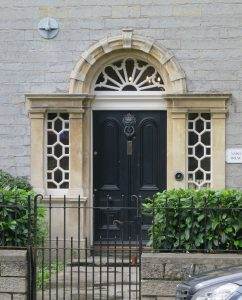 This question is from one of my readers. It’s also a very common question that I get often.
This question is from one of my readers. It’s also a very common question that I get often.
What is the best direction for the front door?
There are many different feng shui schools. So depending on which school you follow, you will get a different answer.
Some emphasize that the cardinal direction of the front door of a home can affect the residents. Others say the birth date of the residents will determine the best direction of the front door.
Depending on the culture in Asian countries, often many say that a front door facing East or North is more auspicious than facing West or South. In form school feng shui, there are two main considerations that dictate the best direction.
1. The geographic and climate considerations
2. The actual environment surrounding the structure
1. The Geographic and Climate Considerations
In ancient China, many believed that having the home face south was auspicious. This is because in China, the Emperor sat in the north and faced south when ruling the country. Because of this, south-facing came to imply power and command. This influenced other buildings in the community such as palaces, temples, and government buildings, to all face south as well.
During the winter months, in colder areas in the northern hemisphere, we want more sun. Therefore, universally, in these areas, not just in China, we want to face south. In Japan, we often hear people say they look for homes or apartments that face south. We all crave to have a sunny home.
Living here in the Pacific Northwest, long gray days from October to June are the facts of life. This winter we had record rainfall and lots of gray skies. It can get a bit depressing. So here, the sun is a BIG deal. When the sun does break out, I find that facing south and getting as much light and warmth makes a huge difference not only to the home but to my whole spirit. It’s literally and figuratively a “ray of sunshine”.
In northern China, cold winds of Siberia blow from the north. In spring, the sandstorms of the Mongolian desert also blow from the north. Under these conditions, it’s no wonder they have a door facing south, away from the cold winds and sandstorms.
You can now understand that the emphasis of facing south is based on Chinese culture as well as the geographic and climate considerations of northern China. But what makes sense in northern China doesn’t necessarily mean it’ll make sense in other places around the world.
For example, many hot climates often deliberately avoid facing south because of too much sun. Being from Hawaii and having lived in Kuwait, I can say this is true. Instead of craving the sun, local people in hot climates look for shade under the trees and awnings to keep cool. In such climates, we know that long exposure to the sun causes a lot of damage to the home and it’s furnishings. The sun fades everything including paint, furniture, window coverings, flooring and more. In Hawaii, we keep the blinds down to keep the sun out! Too much of anything is not good.
2. The actual environment surrounding the structure
What do I mean by this? If you insist on having a front door face a particular direction you can run into many problems. Normally a house faces the road, which means the front door faces the road. Although this is not set in stone and there are many homes that don’t face the road, most do. So, if you dictate your choice by facing a particular direction then it really limits where you buy a home. Also, that means, that all those other people that face in a different direction would develop some sort of issue. So, many times the front door is really dictated by the site location, road, path and the landscape.
In form school feng shui, more important than the direction of your front door, is to make sure you observe and consider your geographic and climate environment. Also, remember to consider the real physical environment. By following these points you will know if the front door is in the best location for your home.



Hi Jenny. I’m new to Feng Shui teachings, but have enjoyed learning/applying what I’m learning to my home. I’m more inclined to use the western Bagua map. I’m looking into purchasing a house that “faces” west, but whose entrance faces south. You enter the front porch from the west (this is also the direction of what seems to be the obvious “front” of the house), but then turn to enter the front door. Would the bottom of the map still be west, or would I need to turn it to line it up with the door?
Hi Carlee,
Good to hear you are enjoying feng shui! There are many schools of feng shui and I follow Form School. We don’t use the bagua map for analysis. Instead our practice uses the built up environment and its form as well as the rules for natural law. In our school, it’s best to face an open space, so for you it sounds like that’s west. Without seeing a picture, I don’t know the exact position of your door. Also, I’m sorry I can’t help you with your bagua map alignment as that’s not something we use.
Hi Jenny,
If you like everything about a house, but it’s in a cul-de-sac, would you still consider buying it? Why or why not?
You didn’t mention it, but are feng shui poisons also a main consideration?
Hi Brooke,
There are lots of things to consider in a cul-de-sac. The scale is one. How big a cul-de-sac is it? How many houses? How wide is the road? Cul-de-sacs can be a great safe place for children to play too. You can check out my new videos on YouTube that I just started to put out. Please check out 3 Frogs Design where I have one on cul-de-sacs.
There could be some concerns on a feng shui poison arrow if the cul-de-sac is very tight. In such situations, build a strong physical barrier between the force and the house. This should help dissipate the energy. I don’t advise using mirrors, it can be more harmful than helpful.